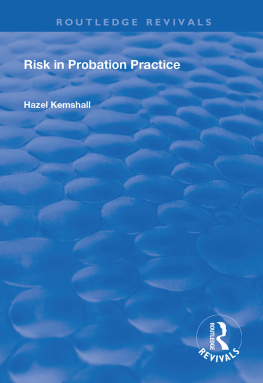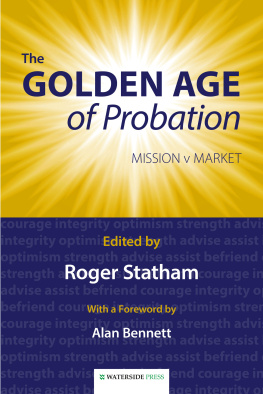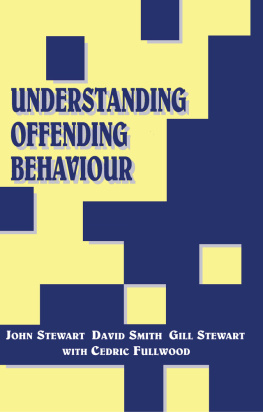First published by Willan Publishing 2002
This edition published by Routledge 2012
2 Park Square, Milton Park, Abingdon, Oxon OX14 4RN
711 Third Avenue, New York, NY 10017
Routledge is an imprint of the Taylor & Francis Group, an informa business
Stephen Farrall
The right of Stephen Farrall to be identified as the author of this book has been asserted by him in accordance with the Copyright, Designs and Patents Act of 1988.
All rights reserved; no part of this publication may be reproduced, stored in a retrieval system, or transmitted in any form or by any means, electronic, mechanical, photocopying, recording or otherwise without the prior written permission of the Publishers or a licence permitting copying in the UK issued by the Copyright Licensing Agency Ltd, 90 Tottenham Court Road, London W1P 9HE.
ISBN 13: 978-1-903240-95-3 (cased)
ISBN 13: 978-1-84392-102-8 (paperback)
British Library Cataloguing-in-Publication Data
A catalogue record for this book is available from the British Library
Typeset by TW Typesetting, Plymouth, Devon
Numerous people assisted in the lumbering development of both the fieldwork and the analysis. In helping to smooth the transition from research design to a workable project, management staff in each of the probation services from which the cases were recruited played an essential part. I would like to express my immense thanks to all the following for their invaluable assistance in helping to set up the project: Mike Frost, Rachel Murphy and Ros Harper (Middlesex Probation Service); Chris Wheeler (Wiltshire Probation Service); Imogen Brown (West Yorkshire Probation Service); Gerry Marshall, Steve Stanley and Pauline Durrance (Inner London Probation Service); John Budd and Martin Wargeant (Essex Probation Service); and Christine Knott, Andrew Underdown and Linsey Poole (Greater Manchester Probation Service).
Senior and main-grade probation officers played an especially important part in enabling the research to be completed: not only were they interviewed themselves, but they recruited probationers into the study and often went to extraordinary lengths to assist the efforts made to trace and secure interviews with probationers. The fieldwork could not have been completed without the assistance of all those working in field offices and it is a testament to the work of probation services that, in addition to their already burdensome workload, staff found time to return calls, arrange interviews and deal with the day-to-day running of a project of this size and nature. Those working in other sectors of the criminal justice system most notably in prisons and hostels must also be thanked for their efforts in helping to secure interviews with probationers.
At the Probation Studies Unit (PSU) and the Centre for Criminological Research (CCR) at Oxford University, Ros Burnett and Roger Hood assisted greatly in the design of the project and very much influenced the tone of the research. Roger also had the thankless task of supervising me a task which he completed with both good grace and humour despite my tendency to focus on the wrong thing or to miss the point completely. If Roger can ever bring himself to read this book again and it would be entirely understandable if he cannot he will notice much which is in no small part due to his own insights and approach to the topic. Similarly, Ros Burnett, Colin Roberts and Richard Young were kind enough, or felt sorry enough, to read drafts of entire chapters along the way. The thesis upon which this book is based was examined by George Mair and Carolyn Hoyle, and I thank them both for the interest with which they discussed the work and their helpful and supportive comments.
Conversations with successive generations of PSU and CCR staff were also insightful, and accordingly I thank Gwen Robinson, Kerry Baker, Giok Ong, Ilona Haslewood-Pocsik, Louise Harsent, Colin Roberts and David Faulkner for their observations on probation supervision, and Richard Young, Carolyn Hoyle, Kimmett Edgar, Ian ODonnell, Ben Goold, Catherine Appleton, Aidan Wilcox and Carol Martin for their observations on a number of topics ranging from current trends in penology to the latest developments in the football transfer market and the EU. Colleagues associated with the PSU, namely, Lady Stephanie North, Simon Merrington and Chris May, provided further comments and encouragement as a final draft was produced. Anne Worrall (at Keele University) also deserves a mention of thanks for taking the time to discuss the emergence of the National Probation Service with me. Thanks are also due to Michael Spence (at Saint Catherines College) for arranging for the college to pay for my attendance at the British Criminology Conference in 1999 and a further conference on analysing reconviction data held at Cambridge University in the spring of 2000.
The project employed a large number of part-time research interviewers to assist with the fieldwork and I thank, in no particular order, all of the following for their efforts during the fieldwork: Jan Appleton, Tony Bullock, Angela Coster, Carol Dowling, Venetia Evergeti, Susan Hill, Amy Horwell, Jamie Kinniburgh, Stuart Lister, Sarah Maltby, Ilona Haslewood-Pocsik, Anne Reuss, Paul Andell, Ejaz Ahmed, Celia Witney, Krishna Kaur, Tom Letchner, Gareth Rees, Kathryn Smith, Rachel Condry, Dawn Gordon, Janet Lee, Lucy Spurling, Ros Harper, Pauline Durrance and Pauline Wilson.
The interviews were transcribed by a number of people. Margit Kail, Hannah Bichard and Christine Holder made excellent work of transcribing all those taped interviews I either could not find the time to do myself or simply could no longer face. Similarly, Sylvia Littlejohns and Steve Ballinger as administrators at the Centre for Criminological Research have provided fantastic support in dealing with the payment and travel claims generated by the fieldwork. Hannah Bichard deserves an additional special mention of thanks for getting me out of numerous computer-assisted disasters. Away from Oxford, conversations with Ben Bowling, Shadd Maruna, Sue Rex, Paul Crosland and Simon Merrington helped me to think about desistance, probation supervision and in the end desistance and probation supervision.
My final thanks must naturally be to the two hundred men and women who took the time and effort to explain in detail how their time on probation and the changes in their lives had either helped or prevented them from staying out of trouble. Without their insights this book would not exist.
Stephen Farrall







